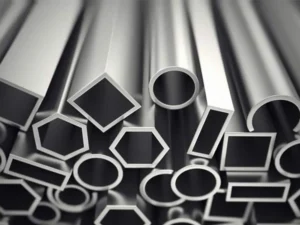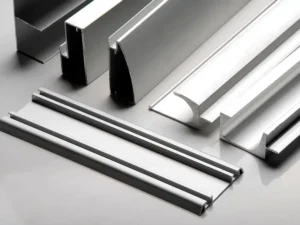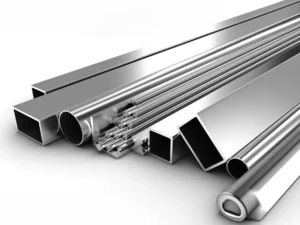Introduction
Not all metals are 100% perfect for the different applications. Some metals, such as aluminum, are aesthetically excellent and lightweight. But they break with a slightly higher force than steel. Therefore, strength comes out to be the flaw. But it is no longer because of the alloys available on the market.
Alloy wipes off the flaws in the metals and retains its original power. It even gives additional abilities. Today, we will discuss aluminum alloy. See how it is powerful compared to other metal combinations. Moreover, we will walk through its features and explain why deploying the aluminum alloys is best.
Let’s talk about aluminum alloy in detail.
What is Aluminum Alloy?

Alloy is the combination of two or more metals. Aluminum alloys are aluminum metals in combination with many other metals. These metals include copper, manganese, and zinc.
Whenever making an alloy, only a particular portion of the metal is combined with another one. Doing so allows for better features and efficiency in the different applications. Many other items feature aluminum alloys. Common examples include automobiles and aircraft industries.
What are favorable metals for aluminum alloys?
When aluminum joins with other metals, an aluminum alloy is the result. But what metals help make an alloy? Usually, they offer additional benefits such as high strength, durability, or hardness.
- Chromium is one of the popular metals for its unbreakable resistance to corrosion. Aluminum might catch the rust. So, an alloy with Chromium makes sure of its stable corrosion resistance.
- Copper. Who doesn’t know copper? It has excellent strength and durability compared to aluminum. Therefore, experts combine aluminum with copper to increase the alloy’s hardness.
- Zinc has both corrosion resistance and hardness properties. The addition of aluminum can create a flawless alloy in terms of durability.
- Manganese is another competitor of aluminum alloy, along with Chromium. It bestows excellent corrosion resistance to the material.
- Silicon offers different features, such as decreasing the shrinkage of the alloy. Casting becomes a no-brainer when using aluminum and silicon alloys.
- Magnesium bestows the corrosion resistance to the material. So, it is also a good candidate for alloys.
These are not the five metals with which you can try the alloys only. Instead, there are tons of other metals with different and unique materials. These add up and increase their strength.
Key Features of Aluminum Alloys

You might be looking for an alloy vs. aluminum combination. The purpose of the alloy is to deliver the best performance. They also retain the additional features with the original aluminum properties.
An aluminum alloy stands out from its original element in the following ways.
Lightweight
Aluminum is a lightweight metal used in many applications. An alloy of aluminum retains the lightweight properties of the aluminum. Check out the density of the alloy for whichever metal you combine. It decides whether the alloy will be lightweight or not.
Corrosion Resistance
Oxidation of the material leads to corrosion. Corrosion quickly damages the metals. It not only destroys the metal structurally but also affects its appearance.
The purpose of making an alloy is to produce corrosion resistance. No oxidation leads to corrosion protection and easy working of metal.
High Strength
You might need clarification about the lightweight material with low hardness. The alloy offers high strength and is helpful for many applications. It owes to using strengthful metals such as copper or manganese. These deliver high performance and better power in the case of tensile strength.
Formability
All metallic applications depend on the formation of its shape. It is also the formability of the metals. Most alloys give formability features to the metals. It allows quick conversion into different shapes. Metal stamping decides whether the metal is easy to shape or not.
Thermal conductivity
Types of aluminum alloys

As discussed earlier, there are different metals. Let’s discuss alloy vs. aluminum and its type based on the combination.
1000 series
The 1000 series of aluminum alloy is quite famous for its aluminum composition. 99% of the aluminum makes it a pure alloy with the highest aluminum content. Such an alloy offers features such as:
- Thermal conductivity
- Ductility
- Corrosion resistance
Because of such features, it has found various applications in chemical tanks and rivets.
2000 series
The 2000 series of aluminum alloy designates its combination with copper. Adding the copper into the aluminum produces high-quality alloys with features of:
- High-temperature resistance
- Better Hardness
- Machinable
The excellent features of such an alloy compel its uses. Commonly, you can find it in the military and relevant applications.
3000 series
All the aluminum alloys with the manganese fall in the category of the 3000 series. This series has peak performance. This is because of the corrosion resistance and durability of the material.
The best features are:
- Corrosion resistant
- Moderate strength
- No heat treatment features
It is effective for cookware or automotive parts construction.
4000 series
The 4000 series refers to the combination of aluminum and silicon. Silicon is quite effective for multiple applications. This alloy has the following features:
- Machinability
- Moderate strength
- Corrosion resistance
Such alloys comprise parts of the automotive engine blocks and other functional parts. You can expect a long-lasting performance and durable strength.
5000 series
Magnesium combines with aluminum to offer corrosion resistance and strength.
Here are some key features of 5000 series alloys.
- Strength
- Durability
- Corrosion resistance
Such alloys are practical for various industries. Pressurized vessels and vehicles often retain such an alloy. It prevents corrosion and maintains their original performance for so long.
6000 series
Earlier, you learned about combining aluminum with another single metal. However, the 6000 series takes two metals, ma, magnesium, and silicon.
Aluminum Alloy retains the corrosion resistance and hardness at the same time.
- Good strength
- Atmospheric corrosion resistance
- Machinable
High strength places them among the top-choice alloys for the construction industry. They may also work for the aerospace and automotive industry as well.
7000 series
Another element combination is the 7000 series. It combines aluminum with zinc. Slight traces of copper, magnesium, and other sound elements are also present in such metals.
They have features like:
- High strength
- Good toughness
- Excellent fatigue resistance
This alloy works in the aerospace industry and manufactures different parts.
Quick Note: We have written a dedicated guide on Aluminum 6061 vs. 6063 alloys. This guide provides a detailed comparison between the two types of aluminum alloys. You should check it out if you are interested in learning more.
Applications of aluminum alloys
The peculiar features of the aluminum alloys make it favorable for different applications. Most home applications are comprised of aluminum, not just windows. Due to its lightweight features, aluminum might replace tons of steel applications.
Here is the list of applications for aluminum alloys.
Automotive
One of the most significant reasons is alloy’s lightweight features. They reduce the overall weight and keep the products in good condition. Apart from automobiles, they are essential for use in boats and ships.
Whenever choosing aluminum alloys, experts look for their different combinations with the metals. It is used in the automotive industry, depending on the features they deploy.
Electrical Applications
Aluminum is a powerful competitor of pure copper in electrical applications. In places that render copper ineffective, replace it with aluminum alloys.
Power transmission to long distances needs lower-density cable usage. Aluminum alloys have a lower density, leading to longer-distance power transmission. In addition, it is easier to operate with better affordability compared to the other metals used.
Consumer Goods
Have you ever noticed the cookware products in the hotel? Take some time to look around your kitchen. Find out which products contain aluminum and its alloys.
Surprisingly, many household products comprise aluminum. Kitchen utensils often come up with washing and water uses. That causes oxidation and corrosion. But aluminum alloys keep the utensils from corrosion. So, it increases their durability and offers a long lifespan.
Medical Applications
Take a short trip to the hospital and surgical theaters. You’ll find that aluminum alloys are used in many applications. Stretchers, surgical instruments, and hospital beds often contain aluminum alloys.
The lightweight properties combined with high strength make them a suitable choice. Moreover, resistance to corrosion promises a long life for the equipment and tools.
Construction
All the outdoor tools are under the overwhelming risk of corrosion. Continuous exposure to moisture and oxidation reduces their lives. Sometimes, it asks for quick replacement after damage.
Don’t worry; aluminum alloys are saviors here too. They help make up the windows, railings, roofing, and framing. The flexibility of the designs puts them among the top choices. It helps design aesthetically appealing equipment. Solid and lightweight designs keep them the optimal choice for the construction industry.
Conclusion
Whichever aluminum alloy you watch, don’t forget one thing— quality. A 100% pure and authentic alloy breathes life into and strengthens your material. But where can you get the best quality aluminum or its alloys?
We have a top aluminum manufacturer— HXSCO. It is one of the top manufacturers with decades of experience delivering high-quality aluminum alloys. The flawless manufacturing and focus on top-notch content make it popular in the town. Contact us right away to check the different aluminum alloys.
